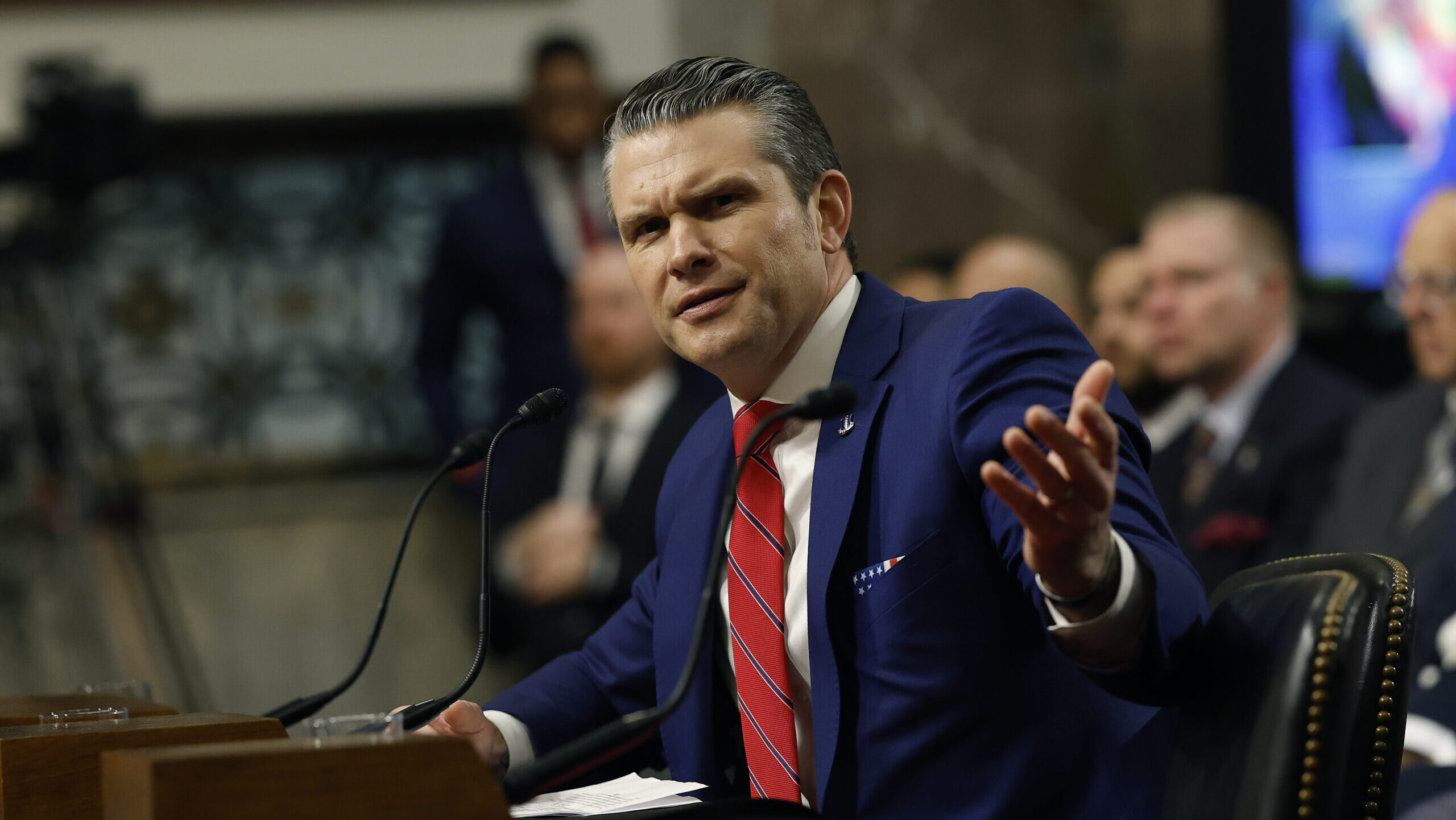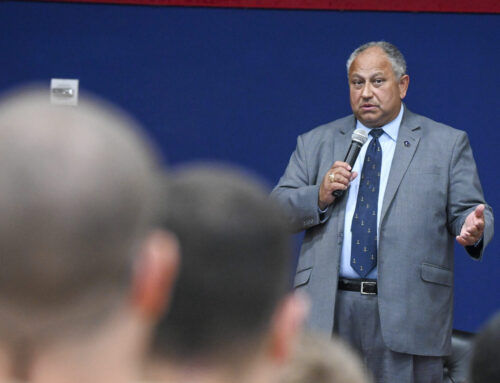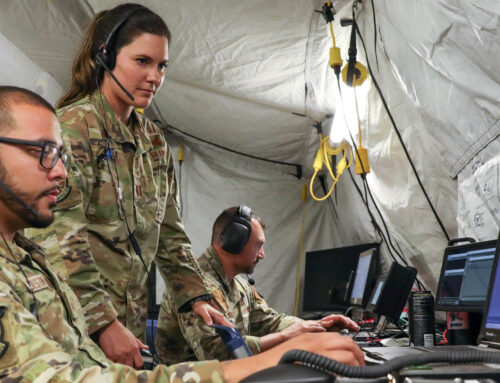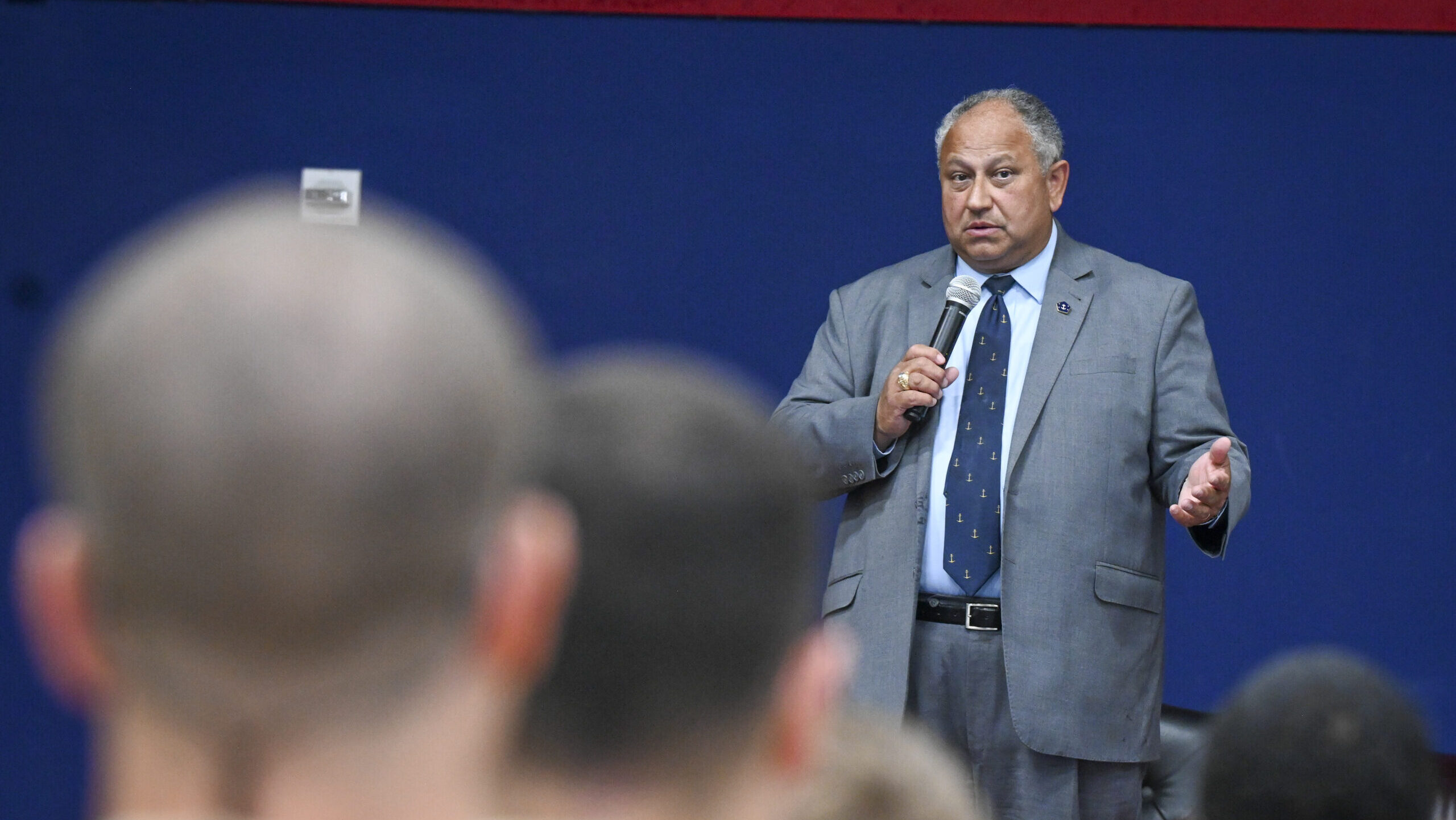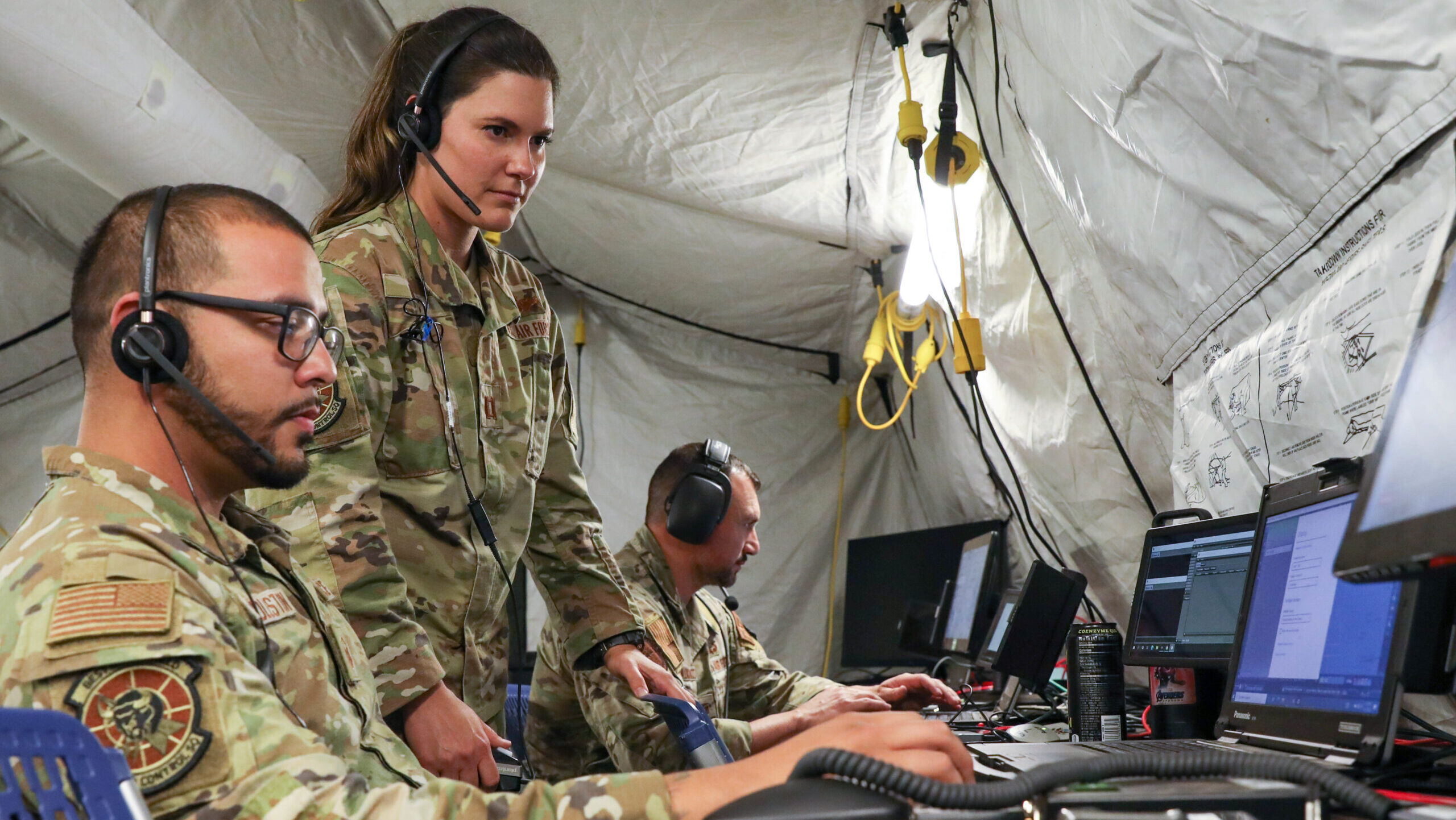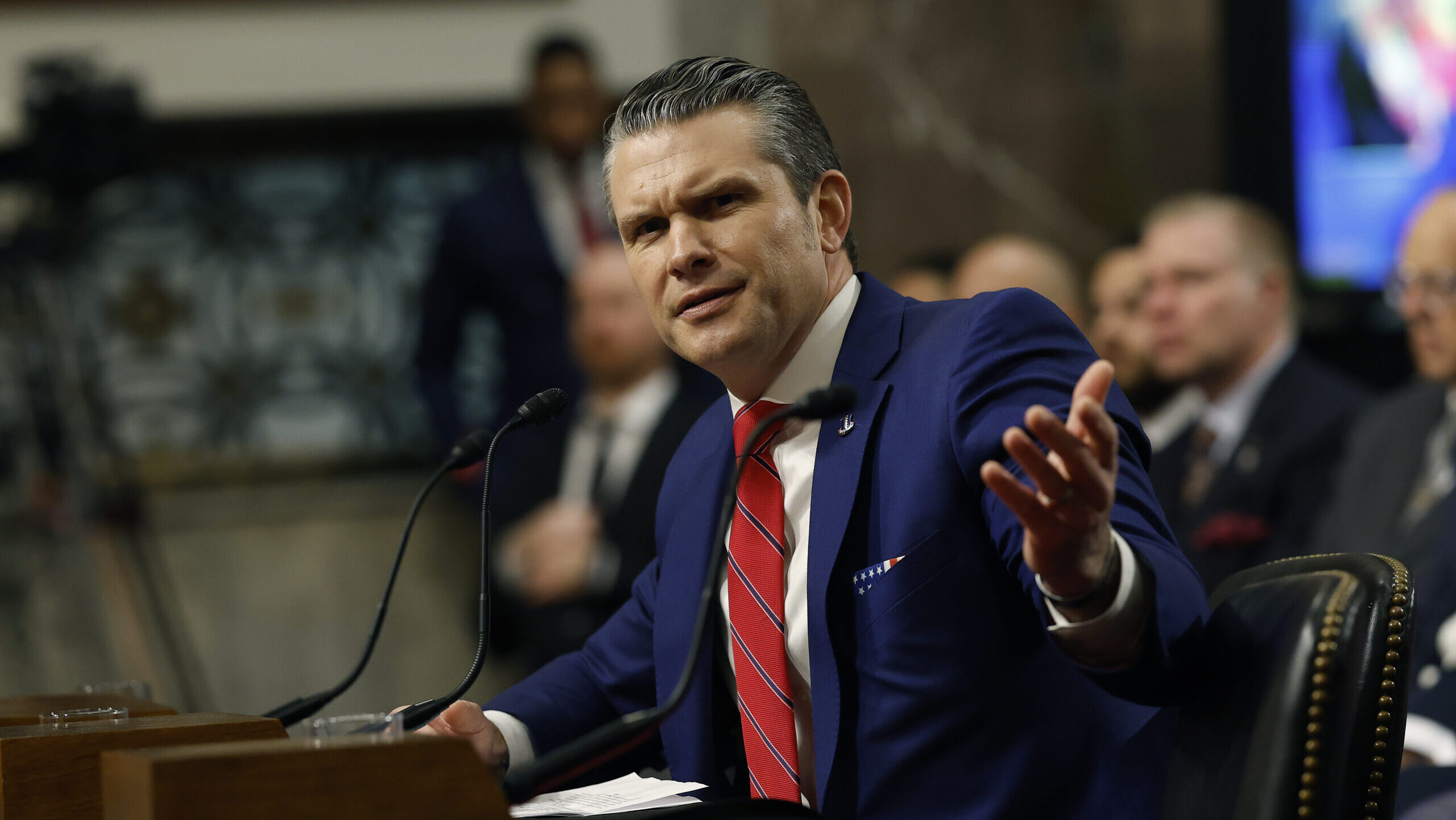
U.S. President-elect Donald Trump’s nominee for Secretary of Defense Pete Hegseth testifies during his Senate Armed Services confirmation hearing on Capitol Hill on January 14, 2025 in Washington, DC. (Anna Moneymaker/Getty Images)
WASHINGTON — In an often confrontational hearing today, Defense Secretary nominee Pete Hegseth went toe-to-toe with Senate Democrats over the role of women in combat, diversity initiatives and, possibly, firing top generals.
And while Hegseth’s testimony was largely about his personal defense over his ability to lead the nation’s military, his written comments give hints as to how the Trump administration views a number of key policy and technology issues.
Since President-elect Donald Trump tapped Hegseth to lead the Pentagon two months ago, he has faced questions about his lack of foreign policy and defense experience, as well as allegations of sexual assault and professional misconduct that he has vehemently denied. Today was the nominee’s turn to push back against some of those concerns when he appeared before the Senate Armed Services Committee, an initial step towards getting a vote on the chamber floor.
But the tone of the hearing was set from the start, with SASC Chairman Roger Wicker, R-Miss., limiting the hearing to only one round of questions over opposition from ranking Democrat Jack Reed of Rhode Island. In turn, Reed, in a departure from the tone he usually takes at such hearings, came out hard at Hegseth.
“I do not believe that you are qualified to meet the overwhelming demands of this job,” Reed said in his opening comments. “We must acknowledge the concerning public reports against you. A variety of sources, including your own writings, implicate you with disregarding laws of war, financial mismanagement, racist and sexist remarks about men and women in uniform, alcohol abuse, sexual assault, sexual harassment, and other troubling issues.”
By and large, his testimony today didn’t sway senators from their political corners, with Democrats filling in behind Reed’s critical opening statement and each picking a topic to focus on.
As anticipated, Hegseth’s take on women in combat was a central topic, though he insisted it has always been about standards. Democratic senators hit back that his lack of experience running a large organization like the Pentagon is a bigger problem than current standards for military jobs.
“You talk about standards, but do you think the way to raise standards at DoD is to lower them for the secretary of defense?” said Sen. Gary Peters, D-Mich.
Republicans, meanwhile, followed Wicker’s lead, who kicked off the hearing saying Hegseth is the right person to bring swift end to “corrosive distractions” like diversity, equity, and inclusion initiatives.
“He will inject a new warrior ethos into the Pentagon, a spirit that can cascade from the top down,” Wicker said during his opening statement. “Mr. Hegseth will bring energy and fresh ideas to shake up the bureaucracy. He will focus relentlessly on the warfighter and the military’s core missions — deterring wars and winning the ones we must fight.”
Republicans cannot afford to lose a single vote in the SASC to push Hegseth forward. Sen. Joni Ernst, R-Iowa, a combat veteran and sexual assault survivor, is seen as a lodestar for whether Hegseth’s nomination moves through committee, but has not definitively said whether she will vote for Hegseth.
During comments during the hearing, Ernst thanked Hegseth for “productive” and “frank” conversations over the past month and asked questions about his dedication to obtaining a clean Pentagon audit, sexual assault prevention, and whether he would commit that combat roles would remain open to qualified women who met the same standards as men.
“Women will have access to ground combat roles, combat roles, given the standards remain high,” Hegseth said. “We’ll have a review to ensure the standards have not been eroded in any of these cases.”
Asked after the hearing whether Republicans had Hegseth’s nomination on a glide path, Sen. Mark Kelly, D-Ariz., responded, “You’d have to ask them.”
Sen. Dan Sullivan, R-Alaska, told reporters after the hearing that Hegseth’s focus on lethality and revitalizing the defense industrial base is “what we have to have.”
In a note to investors after the hearing, Roman Schweizer of TD Cowen said he anticipates Hegseth will be confirmed along party lines.
Digging into the issues
During the four-plus hour hearing, Hegseth steered clear of specifics of what might be coming if he is sworn in as the 29th Secretary of Defense, punting on questions about US support for Ukraine and any specific generals that may be on the chopping block. Senators, in turn, didn’t try to dive deeply into foreign policy and acquisition issues.
Still, Hegseth did offer up some thoughts, both in passing and in his written responses to questions.
When it comes to China, for example, the nominee said if he is sworn in, he will be laser focused on Beijing as the chief strategic competitor.
“We need to accelerate efforts to strengthen our force posture and increase operational capabilities in the Indo-Pacific, given China’s historic and rapid military buildup and the urgent need to reestablish deterrence,” Hegseth wrote in response to questions. “If confirmed, I will review our posture in the Indo-Pacific and identify ways to prioritize such efforts.”
At the same time, he made a minor gaffe during the hearing, answering Democratic Sen. Mazie Hirono’s request to name a single ASEAN country by talking about the US relationship with Japan, South Korea and Australia — all important allies in the region but not members of ASEAN.
On topline defense spending, Hegseth told senators that falling below 3 percent GDP would be “very dangerous,” but the nominee did not commit to any particular spending target.
Pivoting to acquisition and the defense industry base, Hegseth vowed to make both a chief priority and said he would tap his deputy to manage the day-to-day Pentagon activities including the budget, acquisition, and research and engineering. (Trump has nominated Stephen Feinberg, billionaire investor and co-founder of private equity firm Cerberus Capital Management, to be deputy secretary.) His number two, he added, will need to look for ways to speed up weapon development.
“The department has only partially leveraged the potential of our defense industrial base and defense innovation base to cost-effectively deliver capabilities at the speed of relevance,” Hegseth wrote. “Several initiatives have aimed to deliver proliferated, distributed, and attritable capabilities on short timelines, but more work needs to be done to shift the department’s thinking away from developing expensive, exquisite platforms over many years that we cannot afford to lose, toward delivering innovation at scale on compressed cycles.”
Hegseth also called the Office of Strategic Capital and the Defense Innovation Unit a “good start” for pulling private sector technology into the DoD, but he said more needs to be done to make it easier for DoD to do business with emerging companies in the defense space.
As for program specifics, Hegseth’s written responses provide some insights into areas he may focus on if he makes it into the building. Modernizing the nuclear triad, for example, will remain critical as it is a “central and critical foundation of our nation’s strategy,” he wrote. He also told Sen. Deb Fischer, R-Neb., that he currently supports development of a new nuclear-armed sea-launched cruise missile (SLCM-N).
VIDEO: Sen. Deb Fischer on nuclear modernization, hopes for defense under Trump and Ukraine
There will also be a review of the current missile defense programs.
When it comes to the Air Force, he vowed to “carefully review” the service’s Next-Generation Air Dominance fighter plans “to develop a balanced and affordable plan to grow the tactical fighter aircraft fleet that is prepared to win the ‘fight tonight’ against a peer adversary.” There will also be a review, he added, of the KC-46 and Next Generation Air-refueling System to establish a capability roadmap.
Asked during the hearing about the NGAD fighter, Hegseth responded that weapons acquisition is one place where he feels “frankly, a little bit liberated,” because his lack of work experience in the defense industrial base means that he won’t feel tied to “any particular system or any particular company or any particular narrative.”
More broadly, Hegseth indicated a willingness to look at all options when it comes to weapon systems, saying, “I want to know what works. I want to know what defeats our enemies, what keeps us safe, what deters them, what keeps our enemies up at night. Whatever that is, I want more of it. And I want to invest in it.”
For the Navy, Hegseth said he will closely examine plans to reach a 355-ship Navy and work to accelerate growth.
“Shipbuilding is an urgent national security priority,” he wrote. “If confirmed, I will immediately direct the Secretary of the Navy and the Under Secretary of Defense for Acquisition & Sustainment to create a shipbuilding roadmap to increase our capacity within the shipbuilding industrial base, remove bottlenecks within the supply chain, and reduce near-term risk by improving Navy maintenance, repair and overhaul (MRO) capability.”
The Army nearly escaped any promise of a lengthy program review, though Hegseth did note that he would review the department’s ability to conduct intertheater logistics that relies on Army watercraft.
Up in space, Hegseth said he would throw his support behind the development of both offensive and defensive space control capabilities, and said he would review the implementation status of the DoD Commercial Space Integration Strategy and the US Space Force Commercial Space Strategy. The goal, he added, is to determine where the US can “more aggressively embrace our commercial partners and resource accordingly.”


